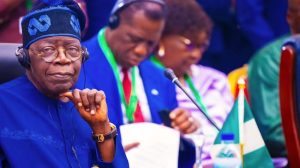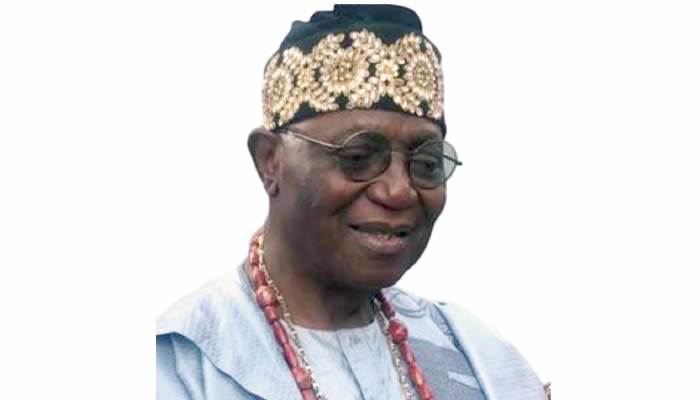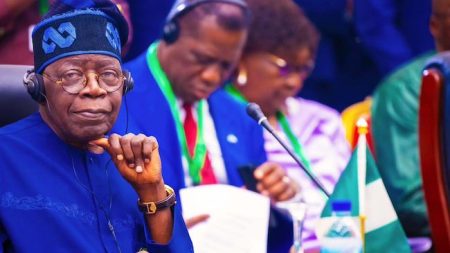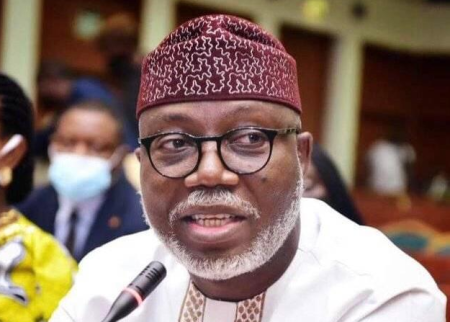Oba Oladipo Olaitan, a prominent leader within the Afenifere socio-cultural group, has launched a scathing critique of President Bola Tinubu’s administration, citing a multitude of failures and questionable practices. His primary concern revolves around the alleged conflict of interest in the Lagos-Calabar coastal road project, where Tinubu openly acknowledged his connection to the contractor, Gilbert Chagoury. Olaitan condemns the lack of transparency in awarding the contract without open bidding, asserting that such actions would warrant impeachment in a functioning National Assembly. He laments the perceived silence of Nigerians on this matter, emphasizing Afenifere’s commitment to speaking out against perceived injustices.
Olaitan further characterizes Tinubu’s performance as a “woeful failure,” pointing to the pervasive insecurity, escalating inflation, and rising electricity costs as evidence of the administration’s shortcomings. He contrasts Tinubu’s campaign promises of 24-hour electricity with the current reality, dismissing them as mere propaganda. Olaitan contends that this assessment is not solely Afenifere’s perspective but reflects the sentiment of a vast majority of Nigerians, asserting that 99% of the populace views the government’s performance negatively. He further criticizes the administration’s reliance on propaganda, citing the stark increase in the cost of living, particularly the prices of vehicles and rent, as tangible indicators of the economic hardships faced by ordinary citizens. He questions the government’s priorities, highlighting the stark contrast between the lavish spending habits of government officials and the financial struggles of the average Nigerian.
The Afenifere leader also accuses the government of wasteful spending, citing the example of the Department of State Services (DSS) constructing Islamic study houses in a secular nation. He expresses concern over this development, urging Nigerians to be vigilant against what he perceives as a gradual erosion of secular principles. Olaitan also criticizes the government’s housing initiative, deeming the planned construction of 20,000 housing units in a year insufficient for a population of over 250 million people. He draws a comparison with a former Central Bank Governor, Godwin Emefiele, who individually built over 730 housing units, highlighting the perceived inadequacy of the government’s efforts.
Olaitan draws parallels between his criticisms and those of the late Pa Ayo Adebanjo, the former leader of Afenifere, emphasizing their shared stance against the current administration. He reiterates Adebanjo’s warnings about the potential for misgovernance and asserts that the current situation validates their concerns. Olaitan accuses the ruling All Progressives Congress (APC) of using anti-graft agencies to coerce opposition figures into defecting, suggesting that the recent wave of defections is driven by fear of prosecution rather than genuine political alignment. He highlights a statement by a former APC chairman, Adams Oshiomhole, who purportedly promised forgiveness of sins upon joining the party. Olaitan alleges that this strategy has been employed by Tinubu since his time as governor of Lagos State, claiming that he has systematically silenced dissent through various means, including economic pressure and targeted harassment.
Addressing the APC’s preparations for the 2027 elections, Olaitan expresses his group’s intent to actively oppose Tinubu’s re-election if he fails to restructure the country. He defends the formation of a shadow cabinet within Afenifere, emphasizing its role in monitoring government activities and proposing alternative solutions. Olaitan criticizes the government’s educational policies, advocating for a comprehensive free education system rather than selective programs like the student loan scheme, which he believes primarily benefits the elite.
Responding to the presidency’s dismissal of Afenifere’s criticisms, Olaitan challenges the government’s claims of progress, questioning the effectiveness of the cash transfer program and the distribution of palliatives. He points to the dilapidated state of public primary schools and the lack of job opportunities for graduates as evidence of the government’s failures. Olaitan suggests that the fuel subsidy removal could have been handled differently, emphasizing the need to address corruption within the oil sector before taking such drastic measures. He further questions the government’s claims of revitalizing healthcare centers, demanding evidence of their existence and criticizing Tinubu’s perceived lack of attention to critical issues like the sinking town of Mokwa in Niger State.
Regarding the issue of internal divisions within Afenifere, Olaitan attributes the factionalism to the government’s deliberate attempts to weaken the group’s opposition. He reiterates Afenifere’s long-standing commitment to the welfare of all Nigerians, regardless of ethnicity, and asserts that their opposition to Tinubu stems from his policies, not his Yoruba identity. Olaitan challenges the presidency’s claims of judicial independence and non-partisanship in electoral appointments, expressing skepticism about the integrity of these institutions. He acknowledges Tinubu’s political acumen but questions whether it serves the nation’s best interests, concluding with a hope for positive change in the future.












